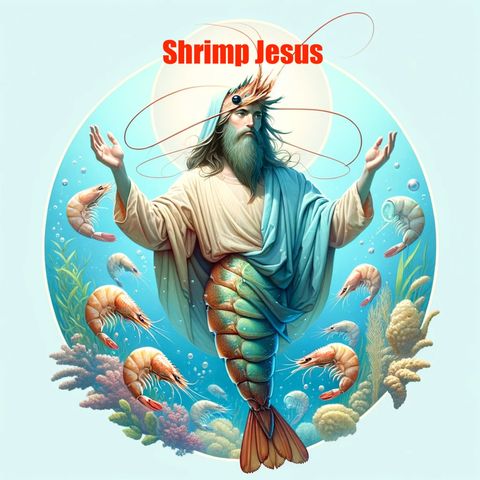Shrimp Jesus continues to grow

Download and listen anywhere
Download your favorite episodes and enjoy them, wherever you are! Sign up or log in now to access offline listening.
Shrimp Jesus continues to grow
This is an automatically generated transcript. Please note that complete accuracy is not guaranteed.
Description
The Curious Case of Shrimp Jesus: Decoding a Viral AI Phenomenon In the ever-churning ocean of social media content, a peculiar phenomenon emerged in March 2024: Shrimp Jesus. This wasn't...
show moreIn the ever-churning ocean of social media content, a peculiar phenomenon emerged in March 2024: Shrimp Jesus. This wasn't a new religious sect, but a wave of bizarre images depicting Jesus Christ formed entirely of shrimp. These AI-generated creations flooded Facebook pages, leaving users bewildered and sparking concerns about the future of online content.
This article dives deep into the curious case of Shrimp Jesus, exploring its origins, social media impact, and the underlying questions it raises about artificial intelligence and our digital landscape.
From Pixels to Prawns: The Birth of Shrimp Jesus
The birthplace of Shrimp Jesus can be traced to the world of artificial intelligence. Generative AI, a type of AI capable of creating new content, is behind these unusual images. While details remain sketchy, it's believed that automated systems were used to produce images based on prompts like "Jesus made of shrimp."
The shrimp theme isn't random. Researchers at Stanford and Georgetown analyzed suspicious Facebook pages responsible for the spread and found a pattern. These pages often churned out AI-generated content featuring nonsensical combinations, like Jesus and flight attendants, or everyday objects like cows with muscles.
A Viral Splash: How Shrimp Jesus Conquered Facebook
The question remains: why did Shrimp Jesus resonate with users? Part of the appeal lies in the sheer absurdity. Here was a beloved religious figure reimagined in a crustacean form – a juxtaposition that tickled the funny bone and sparked online discussions.
Another factor is the manipulative nature of the content. Many Shrimp Jesus posts were accompanied by captions like "Made this by hand!" alongside pleas for likes and comments. This emotional manipulation, preying on the desire to connect and support creativity, likely contributed to the spread.
Facebook's algorithm also played a role. The platform prioritizes engagement, and the bizarre nature of Shrimp Jesus images undeniably led to clicks and comments. This positive feedback loop amplified the reach of AI-generated content, flooding timelines with an onslaught of virtual shrimp saviors.
Beyond the Shells: The Concerns Behind Shrimp Jesus
The rise of Shrimp Jesus is more than just a quirky internet meme. It highlights the growing influence of AI in shaping online experiences. Here are some key concerns:
Disinformation and Manipulation: AI-generated content can be easily fabricated and used to spread misinformation. Fake news disguised as captivating visuals can be difficult to discern, eroding trust in online information.
Algorithmic Bias: Social media algorithms prioritize engagement, potentially amplifying sensational content over factual information. This raises concerns about echo chambers and filter bubbles, where users are only exposed to viewpoints that reinforce their existing beliefs.
The Future of Human Creativity: As AI-generated content becomes more sophisticated, will it overshadow human creativity? Will the online world become saturated with machine-made content, lacking the authenticity and emotional depth of human expression?
The Evolving Landscape: What's Next for Shrimp Jesus and AI
The story of Shrimp Jesus is far from over. As AI technology continues to develop, we can expect to see even more sophisticated and potentially deceptive content emerge online. Here's what we can do:
Media Literacy: Equipping ourselves with the tools to critically evaluate online content is crucial. Scrutinizing sources, identifying AI-generated visuals, and checking for factual accuracy are essential skills in the digital age.
Demanding Transparency: Social media platforms need to be more transparent about content moderation and how algorithms prioritize certain types of content. Users deserve to know what shapes their online experience.
Supporting Human Creativity: While AI has its place, it shouldn't replace human expression. Supporting genuine artistic endeavors and fostering critical thinking skills are essential in a world increasingly shaped by algorithms.
Shrimp Jesus may be a fleeting internet phenomenon, but it serves as a wake-up call. Understanding the power and potential pitfalls of AI is crucial for navigating the ever-evolving digital landscape. By harnessing critical thinking and advocating for transparency, we can ensure that the future of online content remains informative, engaging, and, hopefully, a little less fishy.
Information
| Author | QP-3 |
| Organization | William Corbin |
| Website | - |
| Tags |
Copyright 2024 - Spreaker Inc. an iHeartMedia Company
